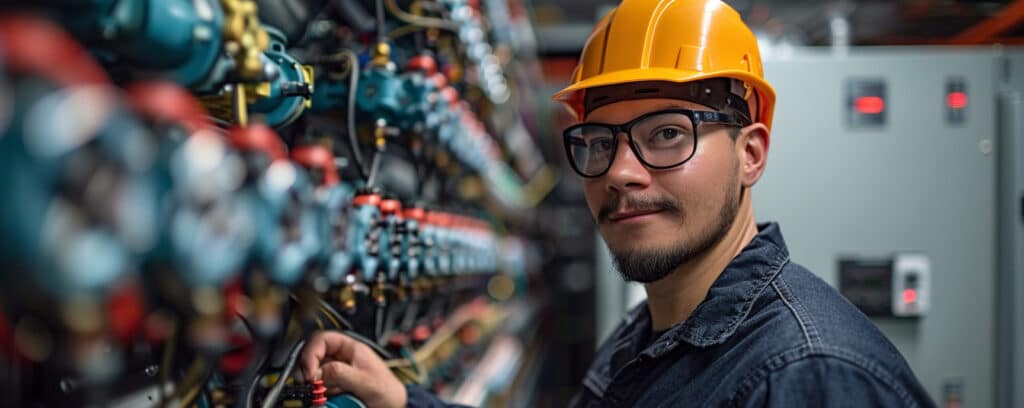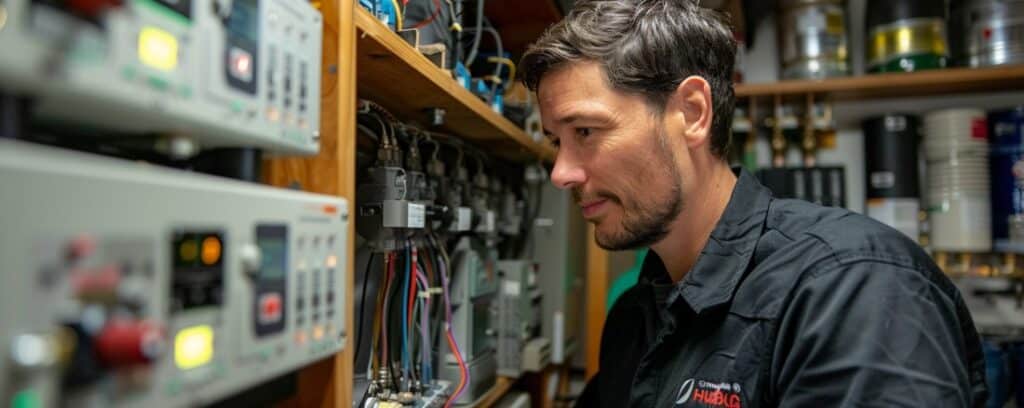- Job Definition: What Is a Refrigeration Technician?
- Job Description: What Does a Refrigeration Technician Do?
- Work Settings: Where Do Refrigeration Technicians Work?
- Refrigeration Technician Education Requirements
- Refrigeration Technician Certification and Licensure Requirements
- Refrigeration Technician Salary
- Refrigeration Technician Job Growth
- Career Advancement Opportunities
- Challenges and Rewards
- Refrigeration Technician FAQ
- What Education Do I Need to Become a Refrigeration Technician?
- What Do Refrigeration Technicians Do?
- How Long Does It Take to Become a Refrigeration Technician?
- What Skills Do I Need to Be a Refrigeration Technician?
- How Much Do Refrigeration Technicians Make?
- Are There Internship/Apprenticeship Opportunities for Refrigeration Technicians?
Refrigeration technicians play a crucial role in maintaining the systems that keep our food fresh, our medical supplies at the right temperature, and our environments comfortable.
Growing demand for refrigeration and climate control systems is driving the need for skilled refrigeration technicians. Offering a blend of technical challenge, problem-solving, and hands-on work, the refrigeration technician career is an appealing choice for those interested in mechanical systems and technology.
Understanding what a refrigeration technician does, the educational requirements, and the job outlook can help prospective students and career changers make informed decisions about entering this field.
Job Definition: What Is a Refrigeration Technician?
A refrigeration technician is a heating, ventilation, and air conditioning (HVAC) professional who specializes in the installation, maintenance, and repair of refrigeration systems. These systems can range from small residential units to large industrial cooling systems.
Refrigeration technicians ensure that these systems operate efficiently and safely, preventing breakdowns and prolonging the lifespan of the equipment. They work in a variety of settings, including homes, businesses, and industrial facilities.
Refrigeration technicians must have a strong understanding of refrigeration principles, electrical systems, and safety protocols. They often work with complex machinery and must be able to diagnose and fix problems quickly to minimize downtime.
This role is essential in industries that rely on temperature-controlled environments, such as food and beverage production, healthcare, and manufacturing.
Job Description: What Does a Refrigeration Technician Do?
Refrigeration technicians are responsible for a wide range of tasks that ensure the proper functioning of refrigeration systems. Their duties can vary depending on the specific job and work environment, but typically include the following:
- Installing Refrigeration Systems: Technicians set up new refrigeration units, ensuring they are correctly connected to power sources, ventilation systems, and other necessary components.
- Performing Regular Maintenance: Routine inspections and maintenance help prevent system failures and extend the life of refrigeration equipment. Technicians clean coils, check refrigerant levels, and replace worn parts.
- Diagnosing and Repairing Problems: When a refrigeration system malfunctions, technicians use diagnostic tools and their expertise to identify and fix issues. This can involve replacing components, fixing leaks, or recalibrating controls.
- Ensuring Compliance with Regulations: Refrigeration technicians must be knowledgeable about safety and environmental regulations. They ensure that systems comply with these standards to prevent hazardous situations and avoid fines.
- Providing Customer Support: Technicians often interact with clients to explain issues, recommend solutions, and provide maintenance tips. Good communication skills are essential for customer satisfaction.
Refrigeration Technician Job Duties
Refrigeration technicians perform a variety of duties to ensure the efficient operation of refrigeration systems. Some of their key job duties include the following:
- Installation: Setting up and connecting new refrigeration units
- Maintenance: Conducting regular checks and servicing to maintain optimal performance
- Repair: Troubleshooting and fixing issues promptly to minimize downtime
- Upgrades: Replacing outdated parts and systems with newer, more efficient technologies
- Record-Keeping: Maintaining detailed logs of work performed and parts used
Refrigeration Technician Responsibilities
The responsibilities of refrigeration technicians go beyond their daily tasks. They are accountable for functions including the following:
- Safety: Ensuring all work is done in compliance with safety standards to protect themselves, their coworkers, and their clients
- Efficiency: Working efficiently to reduce downtime and ensure systems operate at peak performance
- Customer Relations: Building and maintaining good relationships with clients through professional service and clear communication
- Staying Informed: Keeping up with industry advancements and new technologies to provide the best service possible
- Environmental Stewardship: Properly handling refrigerants and other materials to minimize environmental impact
Refrigeration technicians play a vital role in various industries, ensuring that refrigeration systems run smoothly and efficiently. Their expertise and dedication keep critical systems operational, from supermarket freezers to hospital cooling units.
Work Settings: Where Do Refrigeration Technicians Work?
Refrigeration technicians can be found working in a variety of environments, each presenting unique challenges and opportunities. These settings range from residential homes to large industrial complexes, with technicians adapting their skills to meet the demands of each location.
Common work settings for refrigeration technicians include the following:
- Residential Homes: Technicians install, maintain, and repair household refrigerators, freezers, and air conditioning units.
- Commercial Establishments: Places like restaurants, supermarkets, and retail stores rely heavily on refrigeration for their day-to-day operations. Technicians ensure these systems run efficiently to prevent loss of perishable goods.
- Industrial Facilities: Large factories and warehouses use extensive refrigeration systems to store products and materials. Technicians in these settings often work with more complex and larger-scale equipment.
- Healthcare Facilities: Hospitals, clinics, and labs require precise temperature control for storing medications, samples, and other sensitive materials. Technicians ensure these critical systems are reliable and compliant with health regulations.
- Specialized Fields: Some technicians work in niche areas like marine and aviation refrigeration, where they manage cooling systems on ships and airplanes.
Refrigeration Technician Education Requirements
Becoming a refrigeration technician typically requires a combination of formal education and hands-on training. The educational path for this career includes the following steps:
-
High School Diploma or GED: The first step is completing high school or obtaining a GED. High school courses in mathematics, physics, and vocational education can be particularly beneficial.
-
Post-Secondary Education: Many aspiring refrigeration technicians attend technical or community colleges to earn a certificate or an associate degree in refrigeration technology or HVAC. These programs cover essential topics such as the following:
- Basic refrigeration principles
- Electrical systems
- Thermodynamics
- System design and installation
- Troubleshooting and repair techniques
-
Apprenticeships: Hands-on experience is crucial in this field. Apprenticeship programs, which typically last two to five years, provide on-the-job training under the supervision of experienced technicians. Apprenticeships offer a practical understanding of working with different systems and dealing with real-world problems.
-
Continuing Education: The field of refrigeration technology is constantly evolving. Continuing education through workshops, courses, and seminars helps technicians stay updated with the latest advancements and industry standards.
Refrigeration Technician Certification and Licensure Requirements
Certification and licensure are critical components of a refrigeration technician’s career, ensuring they meet industry standards and are qualified to handle various systems safely and effectively. The specific requirements can vary by state and employer, but typically include the following:
- EPA Certification: The Environmental Protection Agency (EPA) requires technicians who handle refrigerants to be certified. There are four types of EPA certification:
- Type I: For servicing small appliances
- Type II: For servicing or disposing of high-pressure appliances
- Type III: For servicing or disposing of low-pressure appliances
- Universal: For servicing all types of equipment
- State Licensure: Some states require additional licensure, which may involve passing a state exam. It’s important to check the specific requirements of the state where you plan to work.
- Professional Certifications: Obtaining certifications from professional organizations can enhance a technician’s credentials. Some popular certifications include the following:
- North American Technician Excellence (NATE) Certification: Recognized industry-wide, NATE certification demonstrates expertise in HVAC and refrigeration.
- HVAC Excellence Certification: HVAC Excellence is another well-regarded certification that validates a technician’s skills and knowledge.
- Continuing Education and Recertification: Technicians must stay current with industry standards and advancements, often through continuing education and periodic recertification.
Obtaining the necessary education, certification, and licensure ensures that refrigeration technicians are well-prepared to handle the demands of their job, maintain safety standards, and provide high-quality service.
Refrigeration Technician Salary
Refrigeration technicians enjoy competitive salaries, which can vary based on factors such as experience, location, and industry. According to the U.S. Bureau of Labor Statistics (BLS), as of May 2023, the median annual salary for heating, air conditioning, and refrigeration mechanics and installers was $57,300. However, salaries can vary significantly.
- Average Salary: The BLS reports that the lowest 10% earned less than $37,270, while the highest 10% earned more than $84,250.
- Highest Refrigeration Technician Salary: Industries such as aerospace manufacturing and government positions tend to offer the highest salaries. For example, technicians working in the natural gas distribution industry earned a mean annual salary of $90,620.
- Highest Paying States: Geographic location also influences salary. According to the BLS, the top-paying states for refrigeration technicians include the following locations:
- District of Columbia: $77,970
- Alaska: $75,660
- Massachusetts: $75,190
- Hawaii: $74,200
- Washington: $72,340
Refrigeration Technician Job Growth
The job outlook for refrigeration technicians is promising, with steady growth expected in the coming years. The BLS projects that employment for heating, air conditioning, and refrigeration mechanics and installers will grow 6% from 2022 to 2032, faster than the average for all occupations.
This growth is driven by several factors, including the following:
- Increasing Demand for Energy Efficiency: As businesses and homeowners seek to reduce energy costs, there is a growing demand for efficient refrigeration and HVAC systems. This trend is expected to continue, creating more job opportunities for skilled technicians.
- Technological Advancements: New refrigeration technologies and the need to upgrade older systems to meet modern standards will also contribute to job growth. Technicians who stay updated with the latest advancements will be in high demand.
- Retirement of Workers: Many current technicians are nearing retirement age, which will open up additional positions for new entrants into the field.
The job outlook for refrigeration technicians varies by region. States experiencing significant construction growth, such as Texas and Florida, are likely to see higher demand for refrigeration technicians. Additionally, urban areas with dense populations and numerous commercial establishments often have more job opportunities compared to rural areas.
Overall, the combination of technological advancements, energy efficiency initiatives, and workforce turnover suggests a strong future for those entering the refrigeration technician field. With the right education, certifications, and experience, refrigeration technicians can look forward to a stable and rewarding career.
Career Advancement Opportunities
Refrigeration technicians have various avenues for career advancement, allowing them to grow their skills, responsibilities, and earning potential over time. Key pathways for advancement include the following:
- Specialization: Technicians can specialize in specific types of refrigeration systems or industries, such as commercial refrigeration, industrial systems, or medical refrigeration. Specialization can lead to higher-paying positions and more complex job roles.
- Advanced Certifications: Obtaining advanced certifications, such as those from NATE or HVAC Excellence, can enhance a technician’s credentials and open up more job opportunities.
- Supervisor or Management Roles: Experienced technicians can move into supervisory or managerial positions, overseeing teams of technicians and coordinating larger projects. These roles typically come with increased responsibilities and higher salaries.
- Business Ownership: Some technicians choose to start their own refrigeration or HVAC businesses, providing services directly to clients and potentially increasing their income through entrepreneurship.
- Continuing Education: Pursuing further education, such as bachelor’s degrees in engineering or business, can lead to roles in project management, sales, or technical consulting within the HVAC and refrigeration industry.
- Teaching and Training: Experienced technicians can transition into teaching roles at technical schools or community colleges, sharing their knowledge and skills with the next generation of technicians.
Advancing in this career requires ongoing education, dedication to learning, and a willingness to take on new challenges and responsibilities.
Challenges and Rewards
Overall, a career as a refrigeration technician can be both challenging and highly rewarding, offering a dynamic and stable career path with numerous opportunities for professional growth and personal satisfaction.
Challenges
Working as a refrigeration technician can be demanding, with several challenges that professionals in this field must navigate:
- Physical Demands: The job often involves physical labor, including lifting heavy equipment, working in confined spaces, and standing for long periods.
- Working Conditions: Technicians may be required to work in uncomfortable or hazardous environments, such as extreme temperatures, noisy industrial sites, or heights.
- Irregular Hours: Many refrigeration technicians are on call for emergency repairs, which can lead to irregular working hours, including nights and weekends.
- Technical Complexity: Keeping up with the latest technologies and regulatory changes requires continuous learning and adaptation. Technicians must stay current with advancements in refrigeration systems and environmental standards.
- Stressful Situations: Diagnosing and repairing critical refrigeration systems quickly can be stressful, particularly when dealing with urgent or complex issues.
Rewards
Despite the challenges, a career as a refrigeration technician offers numerous rewards:
- Job Security: With the growing demand for energy-efficient systems and the need for regular maintenance and repairs, refrigeration technicians enjoy strong job security.
- Good Compensation: Technicians receive competitive salaries, with opportunities for overtime and bonuses. Specialized skills and certifications can further enhance earning potential.
- Variety of Work: The job offers a variety of tasks and environments, preventing monotony and keeping the work interesting. Technicians work with different systems and face new challenges regularly.
- Satisfaction from Problem-Solving: Successfully diagnosing and repairing complex systems provides a sense of accomplishment and satisfaction. Technicians take pride in their ability to restore functionality and efficiency.
- Opportunities for Advancement: The field offers clear pathways for career growth, allowing technicians to advance into higher-paying and more responsible roles.
- Independence and Responsibility: Technicians often work independently, managing their schedules and tasks. This autonomy can be rewarding for those who enjoy self-directed work.
Refrigeration Technician FAQ
What Education Do I Need to Become a Refrigeration Technician?
To become a refrigeration technician, a high school diploma or GED is typically the minimum educational requirement. Many technicians pursue further education through technical schools or community colleges, where they can earn certificates or associate degrees in refrigeration technology or HVAC. These programs provide essential training in areas such as refrigeration principles, electrical systems, and system design. Additionally, hands-on training through apprenticeships is highly valuable and often required to gain practical experience.
What Do Refrigeration Technicians Do?
Refrigeration technicians are responsible for installing, maintaining, and repairing refrigeration systems. Their duties include setting up new units, conducting regular inspections, diagnosing and fixing issues, ensuring compliance with safety and environmental regulations, and providing customer support. They work with various types of equipment, from small residential units to large industrial cooling systems.
How Long Does It Take to Become a Refrigeration Technician?
The time it takes to become a refrigeration technician can vary. Typically, it involves completing a post-secondary education program, which can take six months to two years, depending on whether you pursue a certificate or an associate degree. Additionally, apprenticeships, which provide crucial hands-on experience, can last between two to five years. Therefore, the entire process can take approximately three to seven years.
What Skills Do I Need to Be a Refrigeration Technician?
Refrigeration technicians need a variety of skills to perform their jobs effectively. Key skills include the following:
- Technical Skills: Proficiency in understanding and working with refrigeration systems, electrical components, and diagnostic tools
- Problem-Solving Abilities: The ability to quickly identify and fix issues to minimize downtime
- Customer Service Skills: Good communication skills to explain issues and solutions to clients clearly and professionally
- Attention to Detail: Precision in maintaining and repairing equipment to ensure optimal performance and safety
- Physical Stamina: The ability to handle physically demanding tasks, including lifting heavy equipment and working in various environments
How Much Do Refrigeration Technicians Make?
According to the U.S. Bureau of Labor Statistics (BLS), the median annual salary for refrigeration technicians was $57,300 as of May 2023. Industry-specific and geographic factors can influence earnings, with certain industries and states offering higher pay.
Are There Internship/Apprenticeship Opportunities for Refrigeration Technicians?
Yes, internships and apprenticeships are critical for gaining practical experience in the field. Many technical schools and community colleges offer internship opportunities as part of their programs. Apprenticeships, which combine on-the-job training with classroom instruction, are also widely available and often required.




